The Truth About Career Progression in Allied Health

Some allied health careers begin and end in the clinic, but that’s not for everyone. And it can be hard to see what lies ahead when the road isn’t well-defined.
Imagine you’re working through your second year of a four-year allied health degree. Your lecturer tells you that the average career in your field lasts eight years. How would you feel? Shocked? Determined to buck the trend?
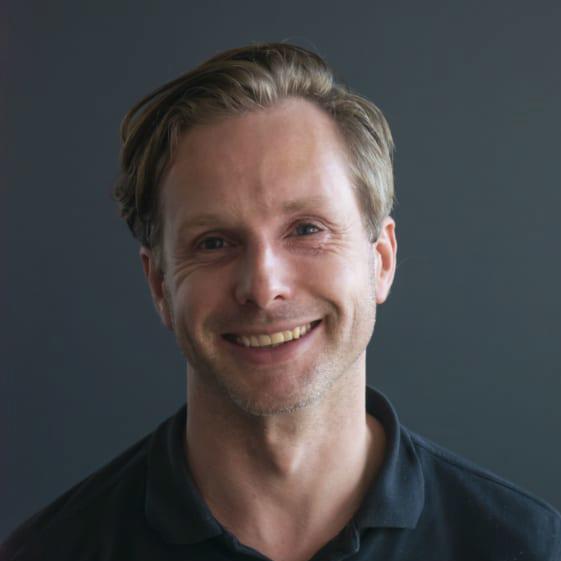
Mark Opar
Head of Strategy — Health
VALD Health
Mark Opar felt both. “I couldn’t believe it — you study for four years!” he says. After already finishing an exercise science degree, only to find that full-time jobs were thin on the ground, he’d launched himself into a Bachelor of Physiotherapy.

Lauren Andreou
Associate Lecturer — Radiation Therapy
University of Newcastle
Lauren Andreou liked her job as a radiation therapist in a large public hospital, helping her patients through their cancer treatment. After earning her degree, she worked in clinical practice for four years. “I loved treating my patients and helping them get better outcomes,” she says.
“But I knew there was something else, something more that I wanted to be doing... it is hard to branch out of the 'allied health' lane.”
For Lauren, too, this was a second crossroads — she’d already changed course once before. After two years in a different degree, she’d realised she wanted to treat cancer. She’d also started a Master’s degree while working full-time.
So what paths lead outside the clinic? To find out, we might have to knock down some walls. Instead of imagining career progression as a straight line, try imagining it as a process of expansion and exploration, sometimes in many directions at once.
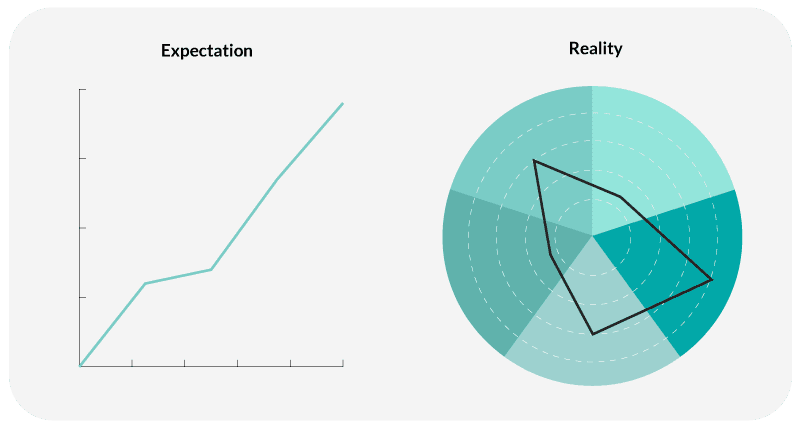
Oh, the places you’ll go
Mark did, in fact, outlast the average tenure for a physio, clocking 11 years in private practice. After seeing first-hand the problems that practitioners face in the sector, he realised how technology could help. “That lit the fire under me,” he says. Mark now works in strategy for a musculoskeletal health technology company, VALD Health, assisting practitioners in using technology to improve their clinical workflow and make better, data-backed decisions.
And Lauren has found her ‘something more’ in education and research. As an associate lecturer at the University of Newcastle, she educates students while working toward a doctoral degree part-time. “My PhD research is on the unique challenges that rural oncology patients encounter, such as having to stay away from home for treatment for long periods of time or having limited access to allied health support.”
But for every allied health professional who’s found their path, others get stuck, lost, or frustrated. Each person’s experience will be different. Career progression, after all, means something different to everyone, with both chance and choice playing a role.
“There are lots of different options out there. Just being able to explore those different options can extend out that average career length.”
For new or jaded allied health professionals, a roadmap could make all the difference.
The Blueprint
In 2013, the Victorian State Government produced just such a map: the Allied Health Career Pathways Blueprint. Let’s take a look at how that can help you get your bearings — whatever stage of your career you are in.
The Blueprint exists to:
Part 1: Work streams
According to the Blueprint, it can be helpful to think of your allied health career as a circle, divided into wedges, or ‘work streams’.
When you begin as an allied health professional, you start in the middle: as a clinical practitioner.
As you gain experience, you begin to branch out and explore more areas.
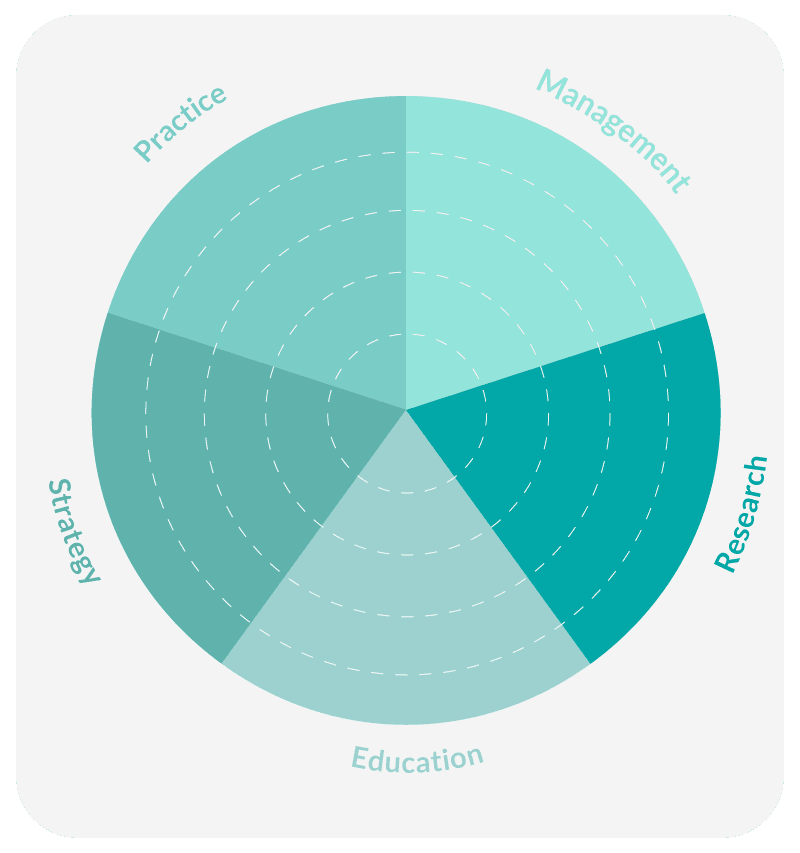
Practice
In the practice stream, you provide healthcare services to patients as a clinician, practitioner or technician. This could involve working in private clinical practice, in a public hospital department, or community, aged care, and disability facilities.
Education
In the education stream, you’re teaching, training, and facilitating others’ learning. This could take the form of delivering professional training to practitioners, tutoring and lecturing students or teaching patients, organisations and communities.
Research
Being involved in research can mean pursuing a PhD. It can also mean participating in research projects for organisations or companies. Research aims to gather new evidence and increase knowledge or find ways to apply research findings into practice, policy, or further investigation.
Management
Management involves taking on management and leadership responsibilities in an area like service delivery or human resources. For instance, you may run the operations of a hospital department or manage a team of practitioners at a smaller clinic. You might also move into a leadership role in a business related to allied health or lead advocacy projects and funding.
Strategy
Strategy involves looking to the future, formulating a vision, and leading change. Long-term planning, managing partnerships and developing policies are all aspects of strategy. This can span a business, organisation, or sector. Over almost 20 years, Dan Auerbach has enjoyed a varied, rewarding career in allied health. His clinical work encompasses both clinical counselling and psychotherapy practice, and he’s also involved in education and management of mental health in the corporate sector.

9 Rewarding Career Pathways for Nurses: Which Kind of Nurse Will You Be?
Interested in how career progression works in nursing? It’s similar, but with differences.
Keep reading >>
Moving across streams
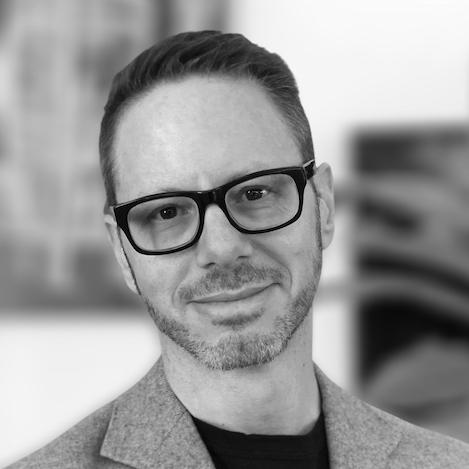
Dan Auerbach
Psychotherapist, Relationship Counsellor and Founder
Associated Counsellors & Psychologists Sydney
Over almost 20 years, Dan Auerbach has enjoyed a varied, rewarding career in allied health. His clinical work encompasses both clinical counselling and psychotherapy practice, and he’s also involved in education and management of mental health in the corporate sector.
Dan has woven together a series of deep specialisations to form a profession that fits him. After a prior career in business, his allied health career led him from drug and alcohol counselling and community work to psychotherapy and relationship counselling. He then combined these skills to create a network of allied health practitioners who now provide clinical services across Australia to both the public and the corporate sector.
But without a roadmap to guide him in the allied health sector, Dan says there was a lot of guesswork involved.
“I was very unaware of what the career opportunities might be. You do the training, but don’t really know what the employment opportunities are. I didn't have much foresight in terms of what it would look like once I got my first qualification.”

Dr Jo Lukins
Psychology and high performance consultant
Author: In The Grandstands and The Elite
Throughout her 30-year career, being adaptable and taking her chances has served Dr Jo Lukins well, enabling her to make the most of serendipity. “A chance happening comes along, and then you take a completely different path,” she says. “I’m not where I intended to be as a young school student, which is the case for many people I know.”
A series of coincidences, mistakes and encounters led her to work for the North Queensland Cowboys rugby league team as a sports psychologist, individual psychology work, and eventually writing two books. When the Captain of the Cowboys, Johnathan Thurston, offered to write the foreword for her book — which is not permitted for a practising psychologist — she decided it was time to take a different tack. “So I went: that’s it, I just won’t be a psychologist anymore.”
Now, she finds herself consulting across a broad range of areas, applying psychological skills and knowledge in different contexts. She translates elite performance psychology for the Defense Force, schools, and companies and is in the process of developing online courses. “What I’ve really enjoyed about my career is the diversity that I’ve had,” she says.
“Giving people pathways is incredibly important because what we don't want our workforce doing is getting stale. The wisdom that you gain from being the practitioner allows you to contribute in other places as well."
Part 2: Growth rings
As you move through your career and into new areas, you’ll expand through what the Blueprint calls ‘growth rings’. This idea recalls the way trees grow: counting the rings on a tree stump to see its maturity. You can move through the growth rings at different rates in different areas.
For instance, you might be developing further skills and knowledge in your area of practice through study while still gaining experience in management by helping your manager with a few of their duties.
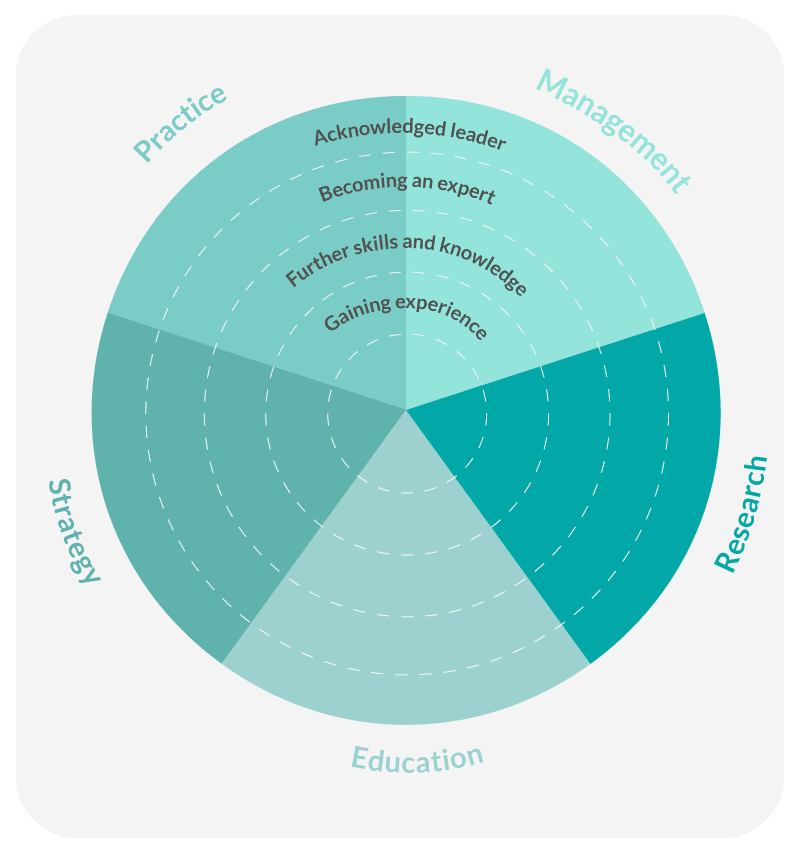
1. Gaining experience
In this stage, you’re getting qualified and applying your learnings to real-world situations. This can include your initial study, work placement, and your first allied health role.
What to focus on
Staying open, curious and flexible. Getting your degree is the beginning of your learning journey — not the end!
To do
“When you're first starting out, you want to take all your opportunities, be quite broad and open to ideas.”
2. Further skills and knowledge
In this stage, you’re going further into an area of interest through an additional qualification. You might be delving deeper into a specialisation within your field, completing a Master’s or a Graduate Diploma/Certificate alongside work. You could also find that your interests broaden and start developing your leadership and management, research, or teaching skills.
What to focus on
Finding a specific area of interest, pursuing postgraduate study.
To do
"My first studies were a graduate diploma in counselling, which was a good start. But then I wanted to do some more in-depth psychotherapy training, so I ended up with a further three years of training in Psychotherapy."
Further study options include:
3. Becoming an expert
At this point, you’ve built up some considerable experience and knowledge, bolstered by some postgraduate study.
This is the perfect time to keep improving your transferable skills, such as in leadership, people management, or informatics and health economics.
What to focus on
Developing deep expertise in a particular area and keeping your knowledge current, applying your skills to new areas.
To do
“I started to develop a private practice network of other clinicians to help them with shared marketing and administration services. That became Associated Counsellors and Psychologists Sydney. We also have a quality assurance standard to assist the public to more easily find access to services.”
4. Acknowledged leader
When you reach this stage of career growth, you’re expanding your influence outside your specific area of knowledge. You might find that your job title has changed to the point where, to an outsider, it’s not obvious you even work in allied health. As a leader, your focus will be on influencing others and making a broader impact.
What to focus on
Giving back to the sector, advocating for its value and applying your knowledge across domains.
To do
"The consulting work is, broadly, across three key domains: defence, education and business. My role is translating the lessons from elite performance for people in different contexts. So that might involve workshops or seminars, podcasts — I try and find lots of different mediums, trying to work out different ways to communicate the message."
Part 3: Career triggers
Every allied health career is different. The way you move through the workstreams and growth rings is unique: directed by your interests, goals, and motivations. But sometimes, it’s not clear what the next step should be. That’s when you might need to trigger some change.
“Transition can come at a time of crisis, but it can also come at a time of confidence,” says Dr Lukins, and suggests going between specialising and broadening your skillset. “It makes things interesting and keeps it fresh.”
Lauren often advises her friends to branch out and embrace change. “It can be scary, going from being in a full-time clinical position, then moving to something that’s not permanent,” she says. “But in order to grow, you have to take a bit of a risk.”
The Blueprint identified four triggers for career growth and change. Think of these triggers as things you can do to get things moving.
1. Find an interest or an emerging trend
Maybe there’s something close to your heart. For Lauren, that was rural healthcare. Growing up in Tamworth, she saw first-hand how difficult it was to access good cancer treatment. Driving hours to a clinic each day or staying at a hotel for eight weeks at a time can mean people are much less likely to seek treatment.
Or perhaps you identify an opportunity to fix a problem or improve a process. For Mark, that was noticing inefficient manual processes, like drawing pictures for exercise programmes or difficult-to-use prescription software.
"I had a couple of examples of patients who were frustrated with the medical hierarchy and the communication flow between professionals. It opened my eyes to the idea that we've got these problems — and technology is a great solution.”
2. Further training and learning
Deciding to return to study can be one of the biggest catalysts for your career. Not only will you gain new skills, knowledge and insights, but you’ll also open new doors.
“Finding psychotherapy as a modality — psychodynamic psychotherapy, which was a very deep way of working with people, understanding personality, at a very deep level — that really fit me."
And while that can certainly be a qualification in your clinical specialisation, there are many other options. You can expand your skillset to bridge the gap between your discipline and another area. For instance, many clinics and hospitals are keen to hire experienced clinicians with a deep understanding of computer systems and informatics.
“Many of my colleagues have done their Masters in IT. Allied health jobs can be quite competitive, and getting a qualification in technology helps you to understand that aspect of it better.”
3. Change up your surroundings
Opportunities abound to work in different contexts, so don’t be afraid to shake it up. Taking a chance to move to another hospital, state, or even country can enable you to see things working differently. This can be a particularly effective move early in your career when looking for a wide variety of experience.
"When you’re finishing your degree, it’s tempting to want to stay in your home town. That’s where your friends are; it’s where your family is. But moving to different places can give you so many new perspectives and opportunities that you couldn’t have had if you’d stayed."
4. Make new connections
Throughout all stages of your career, relationships are integral. Meeting new people with different areas of expertise can open your mind to new ideas and open doors to new opportunities.
Speak to your colleagues who have moved outside of the 'traditional' allied health role. You never know what you may learn from them or become inspired by.
And when you’re looking to embark on further study, it forms a vital part of your research.
“Make sure you talk to lots of people in the industry. Be confident that you have a bit of a vision of what it looks like, where you're heading — before you set out on the journey.”
“It’s an exciting time for young professionals to be coming through to the next stage and launching into the world,” Dr Lukins says. As the allied health industry evolves, you may find that even more paths open up to you. Your career can take you in directions that you haven’t imagined yet. But with a blueprint in hand, you might have a clearer picture of where to explore next.


